

For as often as the video game community is starkly divided on issues, just now and then there will be an annoyance that unites everyone under the banner of a single position. When Valve announced in June 2018 that they would no longer curate the Steam store, the verdict from critics and consumers alike was that this was an act of cowardice on the part of Valve and a neglect of their duty as a store owner. But here's the thing: I think Valve's arguments actually have a lot of unacknowledged merits, and that in many contexts, digital platforms are better off being open canvases as opposed to curated galleries. I'm also disconcerted that during the discussion of this issue, it was uniformly asserted that store owners have a responsibility to filter the products they're selling, but few people ever explained why.
But before we debate the specifics, let's look at how we got here: Valve has had a legacy of lousy curation and a history of learning nothing from the criticism of that curation. Steam Greenlight, Valve's old platform for indie games, was a dumping ground for asset flips and parsimonious cash grabs. The platform allowed creators to post Kickstarter-style pages for the products they were cooking up, and users could vote on whether they would pay for said creators' hypothetical games. But you didn't need evidence that you had developed software to put up a Greenlight page for it, and developers could never quite nail down the number of votes they needed to have their game greenlit. Additionally, some devs were found trading store keys for votes, and games that no one earnestly wanted to buy could be approved because there was nothing to stop users voting for a game and then not purchasing it whereas other crowdfunding services like Kickstarter and IndieGoGo make you put your money where your mouth is.
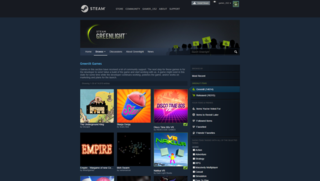
To make matters worse, it was never clear what kind of content was allowed or disallowed in games submitted to Greenlight. The ruleset for the platform was non-committal, and there was always the looming threat that the games that creators had sunk months or years of their lives into could be wiped from the face of the store without warning if Valve chose to interpret their hazy rules differently from the developers. In mid-2017, after much booing of Greenlight, Valve admitted that the service had been less than stellar and discontinued it, replacing it with Steam Direct, an open submission platform from which they vet games directly, but critics and community keeping a close eye on Direct saw no perceptible change in the quality of product being brought onto the store, and Valve left producers no clearer about what they deemed appropriate content for a Steam game.
The company's approach to games featuring nudity and sex had been especially inconsistent. Certain games with sexually titillating content were pulled from their metaphorical shelves, while others featuring comparable or raunchier material stayed, and Valve seemed to particularly have it in for games that featured queer sexual scenes. In the words of game developer Christine Love:
"As long as [Valve] continue to have no policy about anything, and make decisions only based on whim, people are forced to try to interpret their actions and precedents like tea leaves".
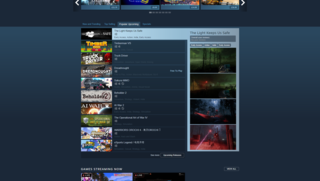
In some cases, Valve's lack of attentiveness meant that games containing bigoted sentiments wormed their way onto the shop (I'm not even going to link out to that hate speech) or that customers found the front page filling up with titles they had no interest in. And while Valve told us the user review system would allow players to navigate what was otherwise a cluttered mess of a marketplace, some games were review bombed, often due to disdain for the progressive politics of the games or their authors. Every one of these issues was compounded by Valve's notorious lack of communication with developers and the public.
One of the company's most visible acts of creator sabotage took place during May 2018 when they threatened to remove a number of visual novels from the platform, citing their erotic elements, before turning face and telling the developers of said novels that they wouldn't be bringing down the banhammer after all. In the same month, fury spread over a school shooting simulator releasing on the store and the amount of time it took Valve to nip it in the bud. These two events seemed to be the catalyst for that blog post from the company's Erik Johnson which responded to heightened uncertainty over what kinds of products were given the thumbs up on Steam. Johnson stated that the company's method to avoid confusion and fights over these guidelines in the future would be to let all content, excluding "troll games", onto Steam and let each community member curate their own experience, building the storefront they want to see. For a few months, Steam sat in limbo, failing to resemble the wild west utopia Valve were imagining, but eventually, the Steam Direct rules were loosened, and a new age of the platform was ushered in when the first uncensored 18+ games began cropping up.
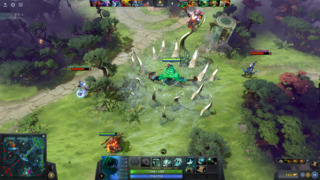
These decisions were in line with Valve's broader fixation on discarding carefully-directed experiences for user-driven ones. A long time ago, the company stopped producing single-player games where developers closely controlled our paths through them and pivoted towards games where our experiences hinge on what other players are doing. There are no more story mode games like Half-Life, but there are multiplayer games like DoTA 2; they're not continuing to make Portal titles, but we can forever play through Portal fan levels with the Perpetual Testing Initiative. Steam Greenlight and Steam Workshop were also flirtations with a laissez-faire approach to player experience. So it comes as no great shock that Valve has decided they want to be less like a Gamestop and more like a YouTube for video games.
And that concept of a YouTube for games doesn't seem so awful to me. We must admit that while it's been traditional for shops to hold the products they stock to a bar of quality, this isn't because we arrived at a consensus that that was the best way to run a store. Physical outlets don't have a choice whether they filter products or not: they contain limited space and so have to pick and choose what they will and won't stock. However, in digital environments, shelf space is effectively limitless, and so a platform can carry an effectively infinite quantity of products or media. This is why, in the internet age, it's become miles easier to find specialist products and media, and why forms of art and entertainment that were previously inconceivable are now blooming.

It's worth us looking at traditional media spaces, as well as conventional stores, as Steam is both a media space and a shop. As it was, the bulk of short-form audio-visual media was beamed to us via television; TV stations only had twenty-four hours in a day to use, and any transmission was a drain on resources, so the stations curated content, and the channels tended towards safe and well-tested programming. When YouTube arrived, airtime was no longer a restriction, and suddenly almost anything anyone wanted broadcast could be broadcast. Vlogs, tutorial videos, video essays, let's plays, and other content that by traditional standards would have been considered too cheap and underproduced to belong on a network thrived, and it was only through allowing anyone to add any content to the platform and allowing users to sift through all of that content that the appeal of these formats was discovered. When it was, it transformed media as we know it.
Imagine, instead, that YouTube had tried to preserve the traditional practices of curation that audio-visual media spaces had used; much of the most popular media today and much of the video material from independent artists would not exist. You can rejig this concept for every online media space from Bandcamp to itch.io, and for physical products in the case of platforms such as Amazon and eBay. We can even think of the internet itself as an open, uncurated platform, and that openness has allowed the rise of whole new forms of media and has revolutionised the exchange of art and entertainment. Between low-entry content hosts like YouTube and Instagram and social media spaces like Twitter and Facebook, most of our digital lives today depend on platform holders not curating content.
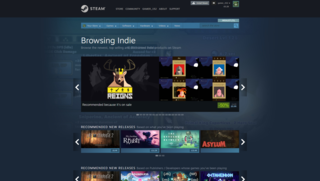
This is not to say that the ideal future would have no curated platforms, but we must be careful to ensure that what happened with TV programmes doesn't happen with games. Allowing an overarching authority to accept titles into or reject titles from the games space based purely on traditional concepts of quality would be suffocating for the medium. Particularly, it would endanger games that attempt to redefine quality and discover it in new places. It would also prevent us as players from experiencing the full range of games people develop, and so limit our capacity to seek out new games, express that those games appeal to us, and say that more of them should be made. I can see an argument that because we have expected shops to curate their wares in the past, it's a betrayal of consumers' expectations for shops not to do the same in the future, but appeals to tradition frequently keep us from finding superior solutions to any problem.
Again, tastes in games, or for that matter, any media, are highly subjective. While personal preference is a factor in how we favour any product, art and entertainment tend to divide people along lines of taste to a greater extent than utilitarian items like pharmaceuticals or power tools. This is, in short, because there is no objective way to measure the quality of anything that is meant to be aesthetically appreciated, whether those aesthetics involve visuals, audio, narratives, or gameplay. Thus, there is no objective standard that any curator could adhere to when deciding what a "quality" product is, and therefore, what they should include in their store. All curation must instead be reliant on appealing to what's popular (that could be popular among all consumers or within certain niche interest groups), the tastes of the store curator, or a mixture of both. Whatever way they do it, such stores try to serve us as individuals by building their product lines for people who aren't us and this is a solution that's bound to have limited success. It would make more sense that the internet should let us dip our hands into a large product pool, but one where we can choose what we take from that pool with minimum effort. Put simply, if taste is personal, then ideally, curation would be personal too.
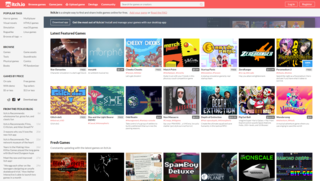
Obviously, some level of curation is non-negotiable in that a store like Valve's can't violate the law, in that customers should not be misled about the product they're buying, and in that hate speech does not deserve a home on any platform. In this sense, all law-abiding and moderated platforms are curated, so when I talk about "uncurated" platforms, I'm talking about those spaces where content is not allowed or disallowed based on notions of quality, not about hypothetical lawless digital environments. But stores like itch.io show the benefits of opening the gates of "quality" as wide as possible. You won't find all the best games on itch.io because it's not where the most eyeballs are, but by refraining from passing quality judgements on any of the products moving through its ports, itch.io has become the defacto store for the experimental and independent. At the same time, they've made it clear they won't allow bigoted propaganda in their space, and that, unlike Steam so far, they will always be accepting of LGBTQA+ art. Similarly, Steam becoming an open platform implicitly solves the problem of them banning queer games, that is, if they can execute on their promise. And it's on the topic of execution that I have to show my full hand.
While I'd seriously question the assumed superiority of curated platforms and believe that uncurated spaces have much to offer as grounds for experimentation and evolution of media, I don't believe an uncurated structure is right for Steam for a couple of reasons. Firstly, when you agree to have your platform flooded with content, you need to give your audience an exceptionally efficient means to sort through the ocean of products you create with that approach. This would be the personal curation I talked about earlier. It's kind of a miracle that on sites like YouTube that have databases with hundreds of thousands of diverse listings, we're able to find the content we want in a flash, but there are key differences in how the YouTubes of the world serve up media in comparison to Steam.

Almost all video and streaming sites, as well as social media sites, work on subscription systems where we opt to receive a steady but typically constant trickle of posts or media from specific creators. Such creators generally produce entertainment or art of a similar type and quality from item to item. But video game release cycles do not provide such continuous access to fresh content from individual creators. Instead of releasing little packages of media every few days or weeks, game developers must spend months or years working on big packages. Often, the cumulative length of the content they produce over this period is shorter than the cumulative length of the content a streamer or video producer would have released in the equivalent time. This means that we are reliant on a lot of different developers to fill our time as other developers work on new games, and in many cases, the difference between any two games produced by the same developer is greater than the difference between any two streams generated by the same video producer or pictures posted by the same photographer. So there's a more pressing need for Steam to be able to introduce us to a variety of creators and Valve have to deal with the vexing issue that there are fewer guarantees that a user will like Content A from a creator just because they enjoyed Content B. Most importantly, while photographs on Tumblr or streams on Twitch are free and simple to access, individual Steam games often require non-trivial investments of time, money, and effort to indulge in.
If YouTube's tools lead you to a bad video, you won't lose any sleep over it. You haven't paid any money for it, you can click away without feeling you've lost anything, and you're probably not going to waste a lot of your leisure time on it. If Steam's signposts convince you to purchase a bad game, you may be tens of pounds out of pocket and not realise until hours in that the journey isn't likely to improve. You can refund Steam games if you've played under two hours, as you should be able to, but it would be a lot less frustrating if Steam hadn't convinced you to purchase a game you're going to hate in the first place. So there's a greater onus on Steam than there is on these other services to be able to direct us to quality products, but our tools for sorting the wheat from the chaff are worse on Steam than on many alternate platforms.
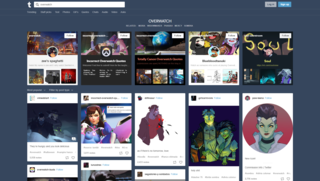
It is important to remember that even if a platform is not curated in terms of what can be posted on it, some material will still be more prominently displayed than other material and various individual pages on these services will be curated. When we search for a certain phrase on Tumblr, if the site prioritises results by relevance or which posts are the most recent, this may be viewed as a form of curation, and search algorithms in themselves are curators. So even if Valve does not take an active role in deciding what should or should not appear on Steam, this does not mean individual pages on the service will be uncurated, but rather, that a broader selection of content will be passed forward to the sorting systems. It is, therefore, vital, that we work out whether those tools for discovering games are reliable.
Steam essentially recommends games to us through five channels:
1. Sales Numbers: This is almost the polar opposite of a personal recommendation. It's a really broad criterion and so, alone, doesn't help anyone who follows games find any titles they won't know about already.
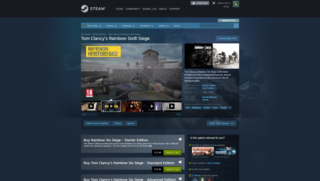
2. The Tagging System: This one lets you find games that fall into certain genre brackets and explore them based on very broad traits such as "Atmospheric" or "Casual". This is one to keep your eye on because Johnson implied in his blog post that Valve wants the tagging system to take over from their curation as store owners. As it is, the community applies all tags, but Valve will also allow developers to set their own product labels. Either way, the tags have always been too vague a categorisation system to rival anything like the YouTube search function. Knowing a game is a "Team-Based Action Shooter" is only of so much use when there are effusively fun team-based action shooters and hopelessly frustrating ones. This labelling tells you little about the nature of a game, and at best, almost nothing about its quality.
3. User Reviews: To my mind, this is, like the first factor, just another form of "popularity", although it's a little more incisive. The people who write reviews for games are often, but not always, interested in the particular genre that game belongs to. However, not only is it possible that your opinions are going to differ from those of the crowd, but the crowd often isn't putting that much thought into the reviews. Steam reviews are the bottom of the barrel for games criticism and often outright dismissive of any content that's progressive, subversive, or trying to engage on an intellectual or heartfelt level. And that's when they're giving honest critiques of games. Valve had to bring in a button to mark joke reviews because scads of meme posts and one-liners skewed the ratings on their platform.
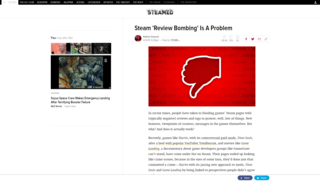
As previously mentioned, some games have also been subject to review bombing in the past and with gaming's various hate campaigns still drifting about, it'll no doubt happen again. On paper, some combination of a robust tagging tool and a rigorous user review system could work, letting us know, for example, not just which games are "Action Fantasy", but also which games are exciting "Action Fantasy". To be fair, Steam goes some way towards that goal, but neither of these systems facilitates anything approaching precise search or recommendation functions, and I can't support handing more curation power to the Steam community after hearing what the prevailing voice of the Steam community is. It is also a system that's reliant on thousands of people submitting unpaid writing work to Valve so take that for what it's worth.
4. Steam Curators: As far as I can tell, these curators don't affect what gets recommended to you or what shows up in the search bar, but members of the community can create lists of games they think are worthwhile with short descriptions of why they have their seal of approval. This is one of the most helpful sorting methods Valve have come up with, but that's not to say it's all that effective either. Curators can recommend games, but the store also needs a method for recommending curators and tends to prioritise many of the gag curators out there. Some of the curators are also representing hate groups. At its best, the Steam Curator system provides a worse version of just going to a website and reading a review because the curator reviews have to be more concise, and thus, are nowhere near as in-depth.
5. What's on Offer: I don't think I even need to tell you why a game being on sale doesn't make it something you'd want to play.
____
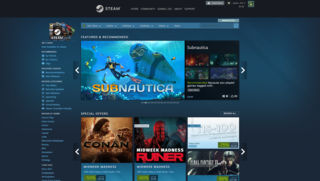
So that's the first reason Steam should remain curated: The tools we're assigned to try and curate our Steam collections are not sufficient to replace a store owner doing the same job, and they make it an annoying task to perform as a customer. The second reason Steam should not convert to a highly open platform is that it is not what people signed up for. While I'd make arguments for open digital platforms in many cases, the bottom line is people should be able to not only receive the content they want, but also the type of store they want.
Back in the late 00s when Steam got popular, it was a curated space, and people at the time thought they were buying into a store that was interested in providing high-quality products. I say "buying into" instead of "shopping at" because if you bought products from a physical store and that store went in a direction you didn't appreciate, you could just shop elsewhere, but Steam ties your purchases to one of its accounts. Plenty of customers put hundreds or thousands of pounds into a curated service for Valve to turn around and tell them that they were going to get something entirely different. Obviously, having your purchases bound to Steam doesn't mean you have to continue shopping in the Steam store, but it makes it that bit less convenient if you now, understandably, want to shop elsewhere. When people bought games on Steam, they didn't just think they were getting the game, they thought they were getting it in the context of the platform, and now that platform has changed, but there's no refund available and no way to port their games to another platform.
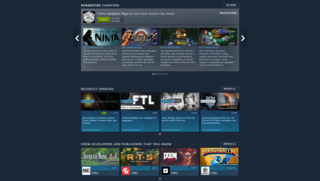
But here's the real kicker: On some level, we shouldn't even be having this conversation. In this discussion, the curation of Steam has so often been synonymous with the curation of the digital PC game environment, and we have to remember they're not quite the same thing, but we arrived at this equivalence for a reason. Steam has, by a wide margin, the fattest share of the digital PC games pie. The standards this one company sets for what is allowed on their digital store have a colossal influence on the PC game biome as a whole. This is because, for many developers, if they can't get their game on Steam, they can't get their game in front of most PC gamers, and they can't justify development costs or keep themselves afloat as human beings. What's more, because Valve is the industry leader, when they set a precedent, it pushes the rest of the market to follow suit. And God knows exactly what Johnson means when he says Valve will lock the door on "troll games". What is a troll game? One that deliberately doesn't boot? One with hate speech? Given their record thus far, I certainly don't trust Valve to police the latter.
In Steam, we supposedly have a market without limitations, but true freedom would mean that when customers are displeased with Steam, they could turn to a store of equal size and convenience. We would be able to pick between platforms where curation exists and others where creators of all grades could mingle and experiment. We'd be able to decide from a selection of different spaces that have many different definitions of "quality", as we've often been able to do with other classes of product. Yet, because of the monopolisation of the PC game marketplace and because many of our games are technologically tied to this one platform, we're now having discussions about whether PC games as a whole should be curated or not, and whether we accept Valve's definition of quality or whether we accept no definition. It shouldn't be like this; there should be a variety of stores just as there's a variety of games.
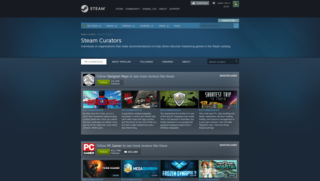
Valve's lack of an official stance on curation may come from their unusually flat company structure. There is almost no hierarchy or official delegation of tasks within the firm, so there's no one to say "This is the bottom line for how we think about what games we host". For now, all I can say is that, with the effects of Valve's monopoly being more corruptive than ever, there is a more urgent need than ever to seek out alternative stores. With Valve pledging for less quality control and good games criticism being a rarity on Steam, it's also more vital than ever that players can find critics who can give them an informed perspective on these issues.
To summarise, if we believe stores should be curated, we need to make a case for it, and I believe there is a compelling argument for the uncurated platform. Open platforms have, in the past, given rise to whole new forms of media, and personal tastes are best matched by personal curation of the widest pool of media, as long as that pool does not include actively harmful content. However, Steam's current lack of accurate navigation and recommendation tools, and its history of harbouring far-right agitators make it is an inappropriate candidate for the open platform route.
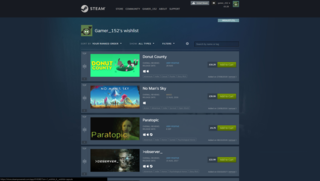
This topic intersects with so many others we barely touched: How we treat pornography in our societies and whether it's valid as art or entertainment, pornography as a means of LGBTQ+ expression, the relationship between games and subjectivity, toxicity in the gaming community, and how markets affect which games get made and our access to them. The conversation about curation is complex enough that until we have concrete opinions on topics like these, we cannot have a fully-formed opinion on how Steam should be curated. Whatever we decide is the correct approach to quality control for Steam, the answer has wider implications, not just for other games stores, but how we organise digital shops and platforms in general, and even what kind of creative culture we foster overall. Thanks for reading.

Log in to comment